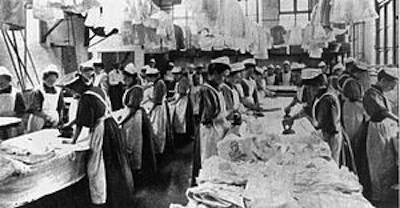
An offical report has found the 26 County state was heavily involved in the religious-run workhouses known as the Magdalene laundries.
Over 74 years, until 1996, thousands of single mothers and other women were made to work in the laundries which were run by nuns from four religious congregations. The laundries operated as a secretive, informal incarceration for women and girls.
The long-delayed report of the McAleese committee, formally known as the Inter-Departmental Committee to establish the facts of State involvement with the Magdalene Laundries, was published this afternoon.
It found substantial State involvement in the laundries. Some 10,000 women and girls entered Magdalene laundries since 1922 with more than a quarter of referrals made or facilitated by the State, the report found.
It found no evidence to support the common perception that “unmarried girls” had babies in the laundries or that some of the detained women had been prostitutes.
“The reality is much more complex” committee chairman Dr Martin McAleese writes in the introduction. The women admitted to the laundries “have for too long felt the social stigma” of the “wholly inaccurate characterisation” of them as “fallen women”, he said. “[This is] not borne out of facts.”
The committee found a wide range of reasons women and girls entered the 10 religious run laundries operating in the State between 1922 and 1996.
Reasons include: referrals by courts, mostly for minor or petty offences; by social services; from industrial and reformatory schools; rejection by foster parents; girls orphaned or in abusive homes; women with mental or physical disabilities; poor and homeless women and girls placed by their families for reasons including socio-moral attitudes.
Women and girls referred from industrial schools and non-State agencies would not have known why they were being sent or how long they had to stay in the laundries, the report finds. Those referred by officials in criminal justice and social services would have been told reason and duration.
“None of us can begin to imagine the confusion and fear experienced by these young girls, in many cases little more than children,” Dr McAleese writes. “Not knowing why they were there, feeling abandoned, wondering whether they had done something wrong and not knowing when, if ever, they would get out to and see their families again”.
The committee found “significant State involvement” with the laundries, Dr McAleese writes. Referrals were made or facilitated by the State made up 2,124 of the 8,025 cases for which reasons are known.
The girls found themselves alone in a “harsh and physically demanding work environment”, Dr McAleese writes. The laundries were “lonely and frightening” places for many of the women.
The committee does not make findings on treatment of women because of the small sample of women available to share their experiences. However, many who have spoken out today have recounted experiences akin to slavery, their lives filled with forced labour and fear, and without education or contact with the outside world.
Magdalene Laundries survivor Mary Smith said the “soul-destroying” laundries were “worse than any prison...I’ll go to my grave with this pain.”
She called on the 26 County government and religious orders to acknowledge the wrong that was done to the women and “the scars that will never go away”.
But the Taoiseach stopped short of issuing a full apology to the women held in the laundries, as many survivors had called for.
“The stigma that the branding together of the residents in the Magdalene laundries needs to be removed and should have been removed long before this,” he said.
“I’m sorry that never happened and I’m sorry that people lived in that kind of environment.”
The first Magdalene laundry in Ireland opened on Dublin’s Leeson Street in 1767. Four female religious congregations came to dominate the running of the laundries.
The Good Shepherd Sisters also operated a Magdalene laundry in Belfast until 1977.
There were 10 Magdalene laundries in the 26 Counties following independence. These were at Waterford, New Ross, two in Cork, Limerick, Galway, and four in Dublin at Dun Laoghaire, Donnybrook, Drumcondra and Gloucester Street/Sean MacDermott Street. This latter - and last - laundry closed in October 1996.
The four congregations who operated the laundries expressed their regret at the impact. Reflecting on the report, the Sisters of the Good Shepherds, the Sisters of Our Lady of Charity, the Religious Sisters of Charity and the Sisters of Mercy said:
“We have become increasingly aware that whereas our intention was to provide refuge and a safe haven, the impact on some who have experienced our care has been something different. We are aware that for some, their experience of our care has been deeply wounding, we deeply regret this.”
![[Irish Republican News]](https://republican-news.org/graphics/title_gifs/rn.gif)
![[Irish Republican News]](https://republican-news.org/graphics/title_gifs/harp.gif)

